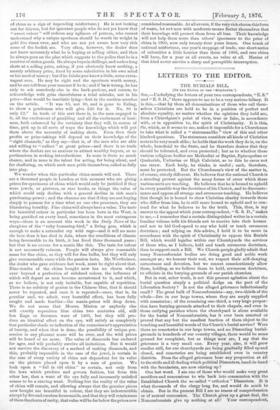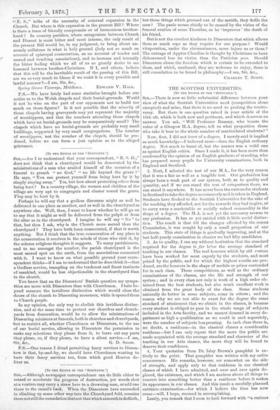LETTERS TO THE EDITOR.
THE BURIALS BILL
(TO TOO EDITOR Or TH13 SPZOTIA013.1
SIR,—Underlying the letters of your two correspondents, "E. S." and "R. S.D.," there appears to me to be a very serious fallacy. It is this,—that by them all denominations of those who call them- selves Christians are held to be in a position of perfect and absolute equality, no matter whether the opinions they hold are, from a Churchpan's point of view, true or false, in accordance with, or in opposition to, the spirit of Christianity. It is this, Sir, which, as it seems to me, makes it impossible for a Churchman to take what is called a " statesmanlike " view of this and other kindred questions. The statesman considers all kinds of Christian sects to be very much alike; he holds that the work they do is, on the whole, beneficial to the State, and he therefore desires that they should be tolerated, and even protected ; but as to whether these various religious bodies are Methodist or Baptist, Episcopalian or Quakerish, Unitarian or High Calvinist, as to this he cares not one straw. Each body, he thinks, is useful ; each, therefore, must be protected. But the Churchman's view of the matter is, of course, utterly different. He believes that the national Church is a standing protest against the many forms of error which these various sects are teaching. He believes that he is bound to uphold in every possible way the doctrines of his Church, and to discounte- nance and oppose all strange and erroneous teaching. He believes that though he is bound to show Christian charity towards those who differ from him, he is still more bound to uphold and to con- tend for what he believes to be the truth. This, then, is my answer to the appeal which your correspondent, "R. S. D.," makes to me,—I remember that a certain distinguished writer in a certain familiar volume tells his friends not to receive into their houses and not to bid God-speed to any who hold or teach erroneous doctrines ; and relying on this advice, I hold it to be more in accordance with the spirit of Christianity to oppose this Burials Bill, which would legalise within our Churchyards the services of those who, as I believe, hold and teach erroneous doctrines, than to support such a Bill. We Church-people gladly admit that many Nonconformist bodies are doing good and noble work amongst us ; we honour their zeal, we respect their self-denying earnestness and devotion, but we cannot conscientiously allow them, holding, as we believe them to hold, erroneous doctrines, to officiate in the burying-grounds of our parish churches.
But in real, sober truth, is not this present agitation about the burial question simply a political dodge on the part of the Liberation Society? Is not the alleged grievance infinitesimally small ? The great bulk of Nonconformists—say, two-thirds of the whole—live in our large towns, where they are amply supplied with cemeteries ; of the remaining one-third, a very large propor- tion have burying-grounds attached to their chapels, and even in those outlying parishes where the churchyard is alone available for the burial of Nonconformists, has it ever been asserted or proved that any but the smallest fraction of them object to the touching and beautiful words of the Church's burial service? Were there no cemeteries in our large towns, and no Dissenting burial- grounds in hundreds of our country villages, there would be some ground for complaint, but as things now are, I say that the grievance is a very small one. Every year, also, it will grow smaller still, for our churchyards are being gradually filled up and closed, and cemeteries are being established even in country districts. Does the alleged grievance bear any proportion at all to the strife and ill-feeling which political Dissenters, hand-in-hand with the Secularists, are now stirring up?
One last word. I am one of those who would make very great sacrifices and concessions to win back into communion with the Established Church the so-called " orthodox " Dissenters. It is what thousands of the clergy long for, and would do much to obtain. But in the present Bill I see no traces of comprehension or of mutual concession. The Church gives up a great deal, the Nonconformists give up nothing at all ! Your correspondent,
"E. S.," talks of the necessity of external expansion in the Church. But where is this expansion in the present Bill ? Where is there a trace of friendly compromise or of harmonious brother- hood ? In country parishes, where antagonism between Church and Dissent is most bitter and most intense, the only result of the present Bill would be, in my judgment, to bring about un- seemly collisions in what is holy ground (holy not so much on account of episcopal consecration, as on account of tender and sacred and touching associations), and to increase and intensify the bitter feeling which we all of us so greatly desire to see lessened between brother-Christians. If I, and others, believe that this will be the inevitable result of the passing of this Bill, are we so very much to blame if we resist it in every possible and lawful manner ?—I am, Sir, &c., Spring Grove Vicarage, Middlesex. EDWARD V. HALL.
P.S.—We have lately had some statistics brought before our notice as to the Welsh chapels and their burial-grounds. Would it not be wise on the part of our opponents not to build too much on these figures? Is it not possible that the minority of those chapels having graveyards may yet represent the majority of worshippers, and that the numbers attending those chapels -which have no burial-grounds may be comparatively small? The ,chipels which have no burial-grounds are probably very small buildings, supported by very small congregations. The number of worshippers, not the number of the chopels, should be pro- duced, before we can form a just opinion as to the alleged grievance.



































 Previous page
Previous page